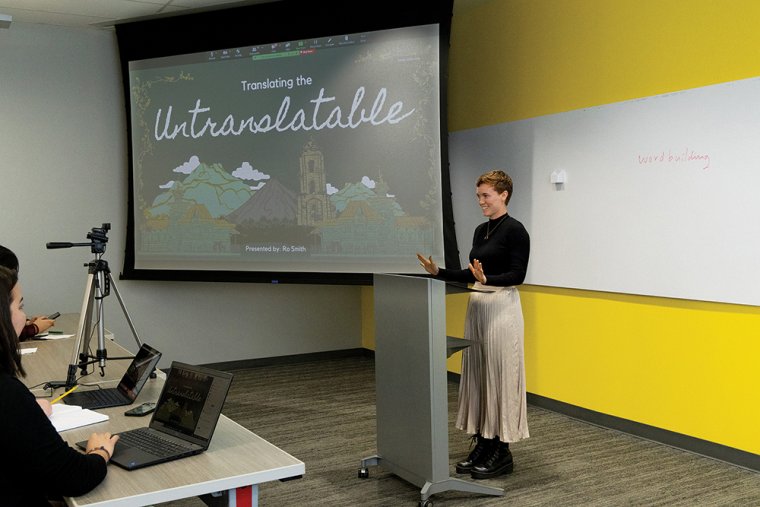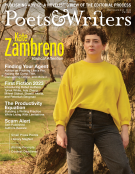Like the creation narrative in the Bible’s book of Genesis, the Worldbuilding Initiative at Arizona State University (ASU) began with “the Word.” But rather than with one Word from an omnipotent creator, the initiative launched in February with new terminology coined by more than a hundred people participating in the Worldbuilding Initiative’s inaugural workshop, “Constructed Languages, Box-Words, and Neologisms: Ways of Naming (and Making) the World.” A public-facing program, the initiative is dedicated to creating what its leaders call “alternative narrative experiences” that encourage participants to take an active role in imagining a more equitable and sustainable future.

Ro Smith, an MFA student at Arizona State University, leads a discussion at the ASU Worldbuilding Initiative’s first workshop in February. (Credit: Meghan Finnerty)
Matt Bell, the ASU creative writing professor who spearheads the initiative, comes to world-building from a fiction background. The author of several novels, story collections, and other books, Bell has taught courses on world-building in science fiction and fantasy, instructing ASU students on how to create alternate universes that compel readers to suspend disbelief. Bell says that effective world-building boils down to simple questions: When you set one thing in motion, what intended and unintended consequences arise? And what ripple effects might further shape the environment?
During the pandemic, when the deep flaws in systems such as U.S. health care and politics became tragically clear, Bell realized the potential for these questions to resonate beyond the creative writing classroom. “We’re training our brain to imagine otherwise,” he says. “How could our world be different?” He concocted a plan to expand his world-building writing course into a broader endeavor that would connect writers, artists, thinkers, and activists from across the university and beyond in activities meant to encourage a sense of collective agency: Rather than passively accept the world as it is, participants in the initiative’s programming would gain some of the creative tools needed to change it. Bell took the idea to ASU’s dean of the humanities, who approved it; then, rallying faculty from other departments, Bell worked for a year to bring the project to fruition.
The Worldbuilding Initiative began during ASU’s spring semester this year, with four single-session workshops, all free and open to the public. Two of these workshops were held on campus, with the option for those outside the university to participate or watch online, and two were offered entirely online. The “Constructed Languages” workshop—one of the hybrid sessions—featured guest speakers Tyler Peterson, an ASU linguistics professor who specializes in endangered Indigenous languages, and MFA candidate Ro Smith, a writer of speculative fiction. Peterson and Smith opened with short lectures interrogating the concept of words, including those that are untranslatable. They also discussed how languages differ, with varying structures and approaches to communicating, and explored how they contribute to identity formation. After providing this framework, Peterson and Smith asked participants to invent new words, encouraging them to question their purpose: Were the words meant to preserve history? To facilitate oral storytelling? Peterson invited people to come up with terms using what Ursula K. Le Guin called box-words: neologisms that act as tiny riddles for the reader to crack open. “Miab,” for instance, from China Miéville’s sci-fi novel Embassytown (Del Rey Books, 2011), means “message in a bottle.”
The initiative also offered a workshop on artificial intelligence (AI), which paired a multidisciplinary professor in the arts and humanities with an MFA student to consider the ethical and visionary dimensions of fictional and real-world AI, including contemporary AI chatbots like ChatGPT and Midjourney. Other workshops included “Sports and Games: Modeling (and Making) Reality Through Play,” about how competitive entertainments mirror and shape social dynamics, and “Democracy, Consensus, and Communal Problem Solving: Imagining New Ways of Making Community,” about how science fiction can help readers understand and overcome antidemocratic and fascist threats. In addition to the workshops, the initiative hosted a lecture this spring by sci-fi author Arkady Martine, who visited campus to discuss the world-building that went into her novels about spacefaring societies.
More than one hundred people from diverse communities attended each workshop, hailing from as far away as New Zealand. “There’s a hunger for this right now,” says Bell, adding that he has been intentional about modeling the initiative on the inclusive world he wishes to create. In addition to the workshops’ openness to the public on multiple platforms, the initiative gathers faculty, graduate students, and professionals from different disciplines to lead programming—offering fair pay to all, Bell says. He has also sought to gather workshop leaders and participants whose identities represent many different races, genders, and sexualities.
The hope for the Worldbuilding Initiative is that the imaginative exercises offered through its workshops and the insight from invited speakers will lead to progress in the real world. In particular, workshops give participants the chance to practice their communication skills about politically fraught subjects, which should strengthen their ability to do so outside the workshop space. Bell’s session on creating community and consensus, for example, featured Malka Older and Miral al-Tahawy—both novelists and activists—who led discussions of topics such as female sexuality and the Arab Spring followed by writing exercises conjuring scenarios in which mutual aid and communal decision-making would play a role.
The Worldbuilding Initiative is slated to continue at ASU in the next academic year, and Bell hopes to be in touch with leaders of similar programs under development at schools such as Rochester Institute of Technology to continue expanding the programming at ASU. Whatever the initiative has in store, it will be driven by its core mission to give people confidence that they can influence the course of events. “Think about the things about the world you’re frustrated with, the things that make you think, ‘There’s no way to change this,’” Bell says. “Well, that’s not true. To imagine it otherwise might be a great first step. Everything was once different.”
Adrienne Raphel is the author of Thinking Inside the Box: Adventures With Crosswords and the Puzzling People Who Can’t Live Without Them (Penguin Press, 2020) and the poetry collections What Was It For (Rescue Press, 2017) and Our Dark Academia (Rescue Press, 2022).









